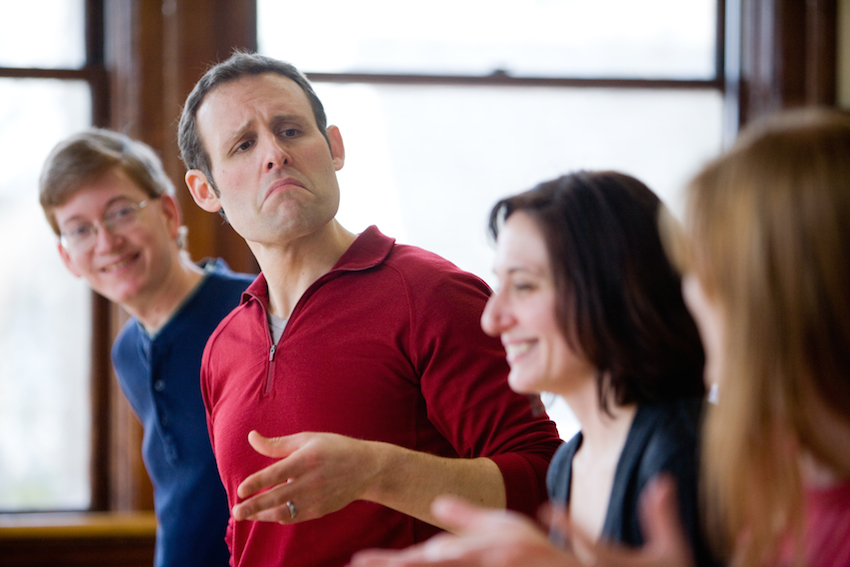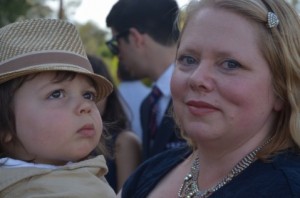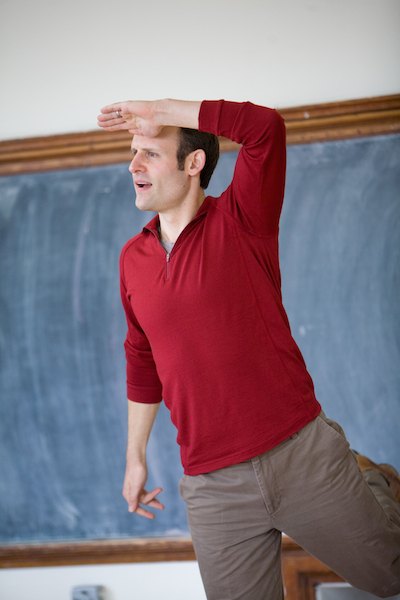
Think on Your Feet with New Improv Class
On March 10, UW Professional & Organizational Development is offering Thinking on Your Feet, a new improv-based class. I recently talked with facilitator Julian Schrenzel about his novel approach to helping people become more effective and innovative at work.
How did your new class for POD come about?
JS: I taught a short workshop on Breaking Through With Improv at POD’s Support Professionals Spring Retreat last year. It was so well-received that POD asked if I’d be willing to facilitate a half-day class for UW faculty and staff. Together we defined the class objectives, and Thinking on Your Feet was born!
It certainly sounds fun—but for those of us who aren’t actors or comedians, what in the world does improv have to do with work?
JS: In order for a team of people to successfully improvise on stage, each person must adopt a few simple but powerful principles. These same principles can benefit anyone wishing to push their boundaries, boost their creativity, and hone their communication, decision-making, or leadership skills.
Doing improv workshops for non-actors, I’ve heard time and again that people find abilities within themselves that they never knew they had. At some point between toddler-hood and adolescence, many of us become conditioned to hide our mistakes and apologize if we don’t perform how we think we’re expected to. Improv can help us break out of this constrained mode that smothers our creativity and makes us less receptive to others and their ideas.
Okay, so give us a hint. What are the magical principles of improv?
JS: Listen with your whole body. Be in a state of agreement and openness so you can build on what your team is creating (yes, and…), rather than shutting down or closing off (no, but…). Silence your inner critic. Own, celebrate, and share failure.
Great—class dismissed!
JS: Well, not quite—this is a case where learning by doing is imperative. The moment that you can stand in front of a small group of people and be absolutely cool with the possibility that you may fail, you have learned the most valuable lesson improv can teach you. In class, we celebrate failure! I want people to fail! We fail and we notice our trained reactions to it, and then we work to find more positive reactions. That brings down a lot of walls. It’s our fears—of failure, of making mistakes—that cause us to shut down and be risk averse.
Every organization wants to become more innovative, but people and organizations can’t simply choose to become more innovative; instead, they become other things that, in turn, facilitate innovation. Probably the biggest stone I help people move in this workshop is working on those other things: being fearless, not apologizing for “mistakes,” being direct, and showing rather than telling. In this class, you will practice a bold and nonjudgmental approach to stepping into the unknown.
Improv also requires people to practice a very high level of awareness and communication. The power of improv can turn a group of people into a high functioning team, able to work together in a very connected way. In improv, you’re listening, you’re sensing the energy of the people you’re working with, you’re looking for cues, you’re exploring, all without judging or condemning yourself or anybody else. The result is opening doors and new kinds of ideas.
What sort of props do you use in class? Are there any rubber chickens?
JS: We’ve got a billion props, but they’re all imaginative! In class, we create our props out of thin air. I might, for instance, ask someone to carry a piano on their back and encourage them to truly feel the weight of that piano and then pass that piano to someone else.
How did you first get into improv?
JS: My formal training in improv came in the early 2000s, when I was in New York pursuing my acting career. That’s when I began attending the Upright Citizens Brigade, a leading improvisation school for actors whose members who have included Amy Poehler and Matt Walsh. But because most performance is improvisational by nature, in a sense I’ve been doing improv nearly my whole life; I’ve been acting and singing since I was a child, and I’m trained as an opera singer.
What inspired you to apply improv to business?
JS: It was during my time in New York that I started thinking about how amazing theater productions are. Large groups of people come together and, through an intense amount of communication and teamwork, deliver a product to a customer—in this case, a play for an audience—in a fairly short amount of time. Why can’t other organizations replicate that? I’ve also worked as a business professional and manager, and my experience has been that there’s often a lot of red tape and paralysis. So, I began deliberating how business could benefit from the rapidity and innovation found in theater.
What would you like to tell people who are absolutely terrified by the idea of improvisation? Should they stay far, far away from this class?
JS: Absolutely not! I’ve worked with all sorts of people, including highly introverted ones, and I have yet to have a person crash and burn in class. I feel I’m a good teacher because I guide people along in a gentle way. If I sense that someone feels uncomfortable doing something, I simply switch it up. It is improv, after all!
After I came back to Seattle in 2007, I signed up to teach an improv class for the Free School. I was concerned when I learned that the people who signed up weren’t actors, but I quickly discovered that people who had no experience with acting got the most out of the improv workshops.
Access registration and course information for Thinking on Your Feet here. Thanks to Julian for providing some insight into the class!
 Jamie Wilson is a senior communications specialist with UW Professional & Organizational Development. She used to lift weights using her nine-pound unabridged dictionary but now has graduated to lifting her toddler.
Jamie Wilson is a senior communications specialist with UW Professional & Organizational Development. She used to lift weights using her nine-pound unabridged dictionary but now has graduated to lifting her toddler.
